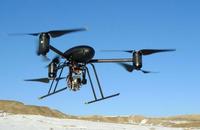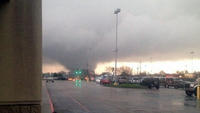-
Maryland drills first responders in response to “large-scale” incident
More than 100 police, fire, first responders, military and civilian personnel took part in a homeland security exercise earlier this month at Battelle in Aberdeen, Maryland. The exercise included intelligence and information sharing, mass casualty care, on-site security and protection, operational coordination, and public information and communication.
-
-
Seattle mayor says no to drones

Seattle mayor Mike McGinn has shut down the Seattle Police Department’s drone program before it started. McGinn said the police need to stay focused on “community building.” The announcement came just one day after the city held a public hearing to discuss restrictions to be imposed on drone use by the police departments. Many citizens voiced their concerns about possible violations of privacy.
-
-
Cleanup starts after Mississippi tornado, storms

Emergency officials in Mississippi spent Monday dealing with the damage after a number of storms and a tornado ripped through the southern section of the state, injuring at least sixty people. No deaths were reported.
-
-
Idaho debating nuclear waste storage
For two decades, the Yucca mountain nuclear waste repository in Nevada was viewed as a long-term solution to the growing problem of radioactive waste generated by the 104 active nuclear power generation plants in the United States. One of the Obama administration’s first acts was to “defund” the project, in effect outing an end to it. States such as Texas, New Mexico, and North Carolina have fashioned their own interim solution to the problem of nuclear waste storage, and the governor of Idaho wants his state to follow these states’ example.
-
-
Florida restricts the use of drones by law enforcement agencies
States continue to restrict the use of drones by law enforcement agencies. Florida police agencies wanted state lawmakers to make a special exception in a bill which bans the use of UAVs by law enforcement, so that drones could be used for crowd control. The bill, however, won the approval of the Senate Community Affairs Committee without the exception.
-
-
Iowa implements Real ID act, but other states hold firm in opposition
Last month Iowa joined other states in implementing the REAL ID Act, which Congress passed in 2005 in an effort to combat terrorism in the aftermath of 9/11. The intense debate over the act continues, though: twenty-five states have passed resolutions rejecting REAL ID, with fifteen of them going as far as to make it illegal to comply with the act.
-
-
Bangladeshi man pleads guilty to trying to blow up the Federal Reserve Bank building

A Bangladeshi man who triedattempted to use a weapon of mass destruction to blow up the New York Federal Reserve Bank has pleaded guilty to the charges. Under the plea agreement, he will faces up to life in prison.
-
-
New internally cured concrete increases bridge life span
Concrete is normally made by mixing portland cement with water, sand, and stone. In the curing or hardening process, water helps the concrete mixture gain strength by reacting with the cement. Traditionally, curing is promoted by adding water on top of the bridge deck surface. The new technology for internal curing provides additional water pockets inside the concrete, enhancing the reaction between the cement and water, which adds to strength and durability. This new technology is enabling Indiana to improve bridges in the state with a new “internally cured” high-performance concrete.
-
-
NY to buy, demolish beachfront homes, make way for storm buffers

New York governor Andrew Cuomo plans to use $400 million in federal funding to buy beachfront homes as part of a broader plan to reshape the New York coastline so the state is better prepared for sea level rise, surges, and storms. The plan is to raze the purchased homes and leave to shore front vacant. Some properties would be turned into dunes, wetlands, or other natural buffers. Other parcels could be combined and turned into public parkland.
-
-
Miles tax may soon replace gas tax as a way to fund infrastructure maintenance
With infrastructure around the country in a state of disrepair, many states and lawmakers are trying to find a way to fund improvement of roads and bridges. The federal gasoline tax brings in fewer dollars each year, and now some lawmakers and transportation experts are considering the idea of taxing citizens by how far they drive each year instead of the amount of gasoline they buy each year.
-
-
Springfield, Illinois, faces infrastructure woes
As is the case with other cities, the infrastructure of Illinois’ capital, Springfield, is decaying. Experts told the city council that it would take $86.6 million over the next three years to shore up the city’s streets and sewer system, and $22.5 million a year thereafter to maintain it. The city is now grappling with how to raise the necessary funds.
-
-
Illinois expected to change law to allow carrying concealed guns
Illinois is the last state in the union that has a complete ban on carrying concealed weapons. Judge Richard Posner of the 7th Circuit Court of Appeals ruled that the current ban on concealed carry is unconstitutional and said some authorization of citizen concealed carry is long overdue.
-
-
Arizona may require hospitals to report undocumented immigrants seeking care
A bill before the Arizona legislature aims to track how many undocumented immigrants are receiving free medical care at hospitals in Arizona. The bill would require hospitals to confirm a person’s legal presence in the country if the individual seeking care does not have insurance. If the staff thinks the patient is here illegally, they must notify authorities.
-
-
Tight money hampers Detroit police
A non-profit data sharing consortium approached the Detroit Police Department last summer to see whether the department would like to join the consortium’s regional system and share technology that would allow the department effectively to put hundreds of officer back on to the streets. Joining the Courts and Law Enforcement Management Information System (CLEMIS) would have cost the city $1.2 million a year, which the city says it cannot afford.
-
-
Georgia police gets military-grade weapons
Metro Atlanta police departments and sheriff’s offices have recently acquired some new toys which include armored trucks, grenade launchers, and personnel carriers. According to the Georgia Department of Public Safety, $200 million in military equipment and weapons are owned by 600 Georgia law enforcement agencies. This military grade equipment has some people concerned as to why local law enforcement agencies are so heavily armed.
-
More headlines
The long view
Smaller Nuclear Reactors Spark Renewed Interest in a Once-Shunned Energy Source
In the past two years, half the states have taken action to promote nuclear power, from creating nuclear task forces to integrating nuclear into long-term energy plans.
